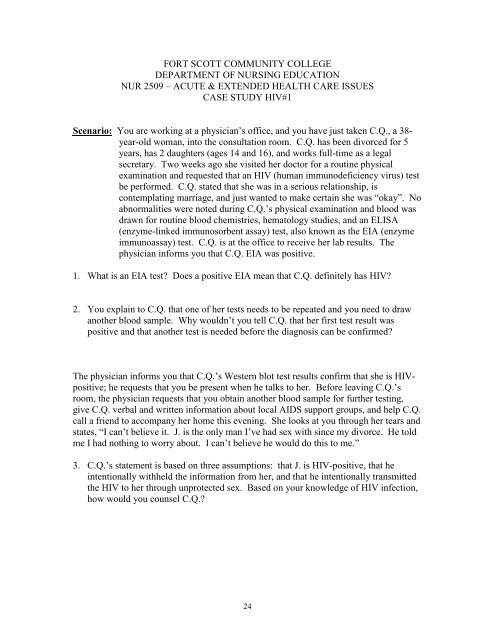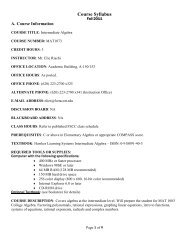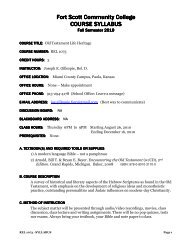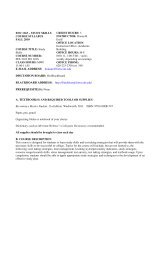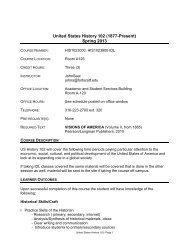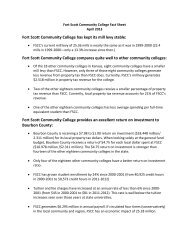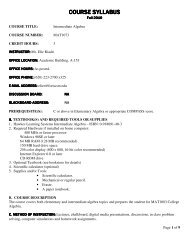laboratory and clinical booklet - Fort Scott Community College
laboratory and clinical booklet - Fort Scott Community College
laboratory and clinical booklet - Fort Scott Community College
Create successful ePaper yourself
Turn your PDF publications into a flip-book with our unique Google optimized e-Paper software.
FORT SCOTT COMMUNITY COLLEGE<br />
DEPARTMENT OF NURSING EDUCATION<br />
NUR 2509 – ACUTE & EXTENDED HEALTH CARE ISSUES<br />
CASE STUDY HIV#1<br />
Scenario: You are working at a physician‟s office, <strong>and</strong> you have just taken C.Q., a 38-<br />
year-old woman, into the consultation room. C.Q. has been divorced for 5<br />
years, has 2 daughters (ages 14 <strong>and</strong> 16), <strong>and</strong> works full-time as a legal<br />
secretary. Two weeks ago she visited her doctor for a routine physical<br />
examination <strong>and</strong> requested that an HIV (human immunodeficiency virus) test<br />
be performed. C.Q. stated that she was in a serious relationship, is<br />
contemplating marriage, <strong>and</strong> just wanted to make certain she was “okay”. No<br />
abnormalities were noted during C.Q.‟s physical examination <strong>and</strong> blood was<br />
drawn for routine blood chemistries, hematology studies, <strong>and</strong> an ELISA<br />
(enzyme-linked immunosorbent assay) test, also known as the EIA (enzyme<br />
immunoassay) test. C.Q. is at the office to receive her lab results. The<br />
physician informs you that C.Q. EIA was positive.<br />
1. What is an EIA test? Does a positive EIA mean that C.Q. definitely has HIV?<br />
2. You explain to C.Q. that one of her tests needs to be repeated <strong>and</strong> you need to draw<br />
another blood sample. Why wouldn‟t you tell C.Q. that her first test result was<br />
positive <strong>and</strong> that another test is needed before the diagnosis can be confirmed?<br />
The physician informs you that C.Q.‟s Western blot test results confirm that she is HIVpositive;<br />
he requests that you be present when he talks to her. Before leaving C.Q.‟s<br />
room, the physician requests that you obtain another blood sample for further testing,<br />
give C.Q. verbal <strong>and</strong> written information about local AIDS support groups, <strong>and</strong> help C.Q.<br />
call a friend to accompany her home this evening. She looks at you through her tears <strong>and</strong><br />
states, “I can‟t believe it. J. is the only man I‟ve had sex with since my divorce. He told<br />
me I had nothing to worry about. I can‟t believe he would do this to me.”<br />
3. C.Q.‟s statement is based on three assumptions: that J. is HIV-positive, that he<br />
intentionally withheld the information from her, <strong>and</strong> that he intentionally transmitted<br />
the HIV to her through unprotected sex. Based on your knowledge of HIV infection,<br />
how would you counsel C.Q.?<br />
24


